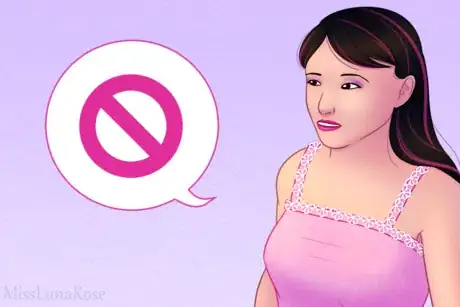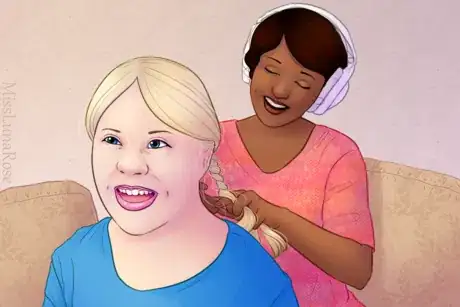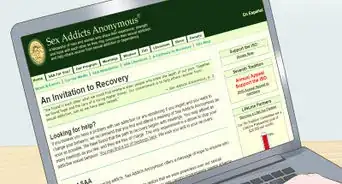This article was co-authored by Peggy Rios, PhD. Dr. Peggy Rios is a Counseling Psychologist based in Florida. With over 24 years of experience, Dr. Rios works with people struggling with psychological symptoms such as anxiety and depression. She specializes in medical psychology, weaving together behavioral health programs informed by empowerment theory and trauma treatment. Dr. Rios uses integrated, evidence-based models to provide support and therapy for people with life-altering medical conditions. She holds an MS and Ph.D. in Counseling Psychology from the University of Maryland. Dr. Rios is a licensed psychologist in the state of Florida.
There are 24 references cited in this article, which can be found at the bottom of the page.
wikiHow marks an article as reader-approved once it receives enough positive feedback. In this case, several readers have written to tell us that this article was helpful to them, earning it our reader-approved status.
This article has been viewed 1,210,429 times.
Staying a virgin in a sex-obsessed society can be a challenging task. You'll find that setting strong and healthy personal boundaries is key to maintaining autonomy over your own body, and, further, to setting the terms of what you are and are not comfortable with doing with a partner.
Steps
How to Define Your Own Boundaries
-
1Consider your reasons. Understanding why this decision is important to you is a big part of maintaining it. Take some time to examine your reasoning. Don't be a virgin because of your parent(s), your religious leaders, your partner, or a wikiHow article—be a virgin if it feels like what is best for you.[1] Try listing your thoughts in a journal, so you can look at them whenever you feel like it. Potential reasons for abstaining include...[2]
- Your religious, spiritual, or personal beliefs include waiting or abstinence.
- You don't feel ready or interested.[3]
- You're asexual, and you think that sex sounds boring or gross.
- You want your first time to be with someone special.
- You lack access to contraception, barriers, or sexual healthcare.
- You are underage, or feel that you are too young.
- You have fears about your safety: either you are scared of pregnancy, STIs, etc. or your family is strict and your emotional health or safety would be compromised if they caught you.[4]
-
2Consider your time frame. For how long do you want to be celibate? Most people do not live their entire lives as virgins, and it's good to set clear and reasonable goals for yourself. Think about how long you want to stay a virgin, and know that you can always modify the decision if it no longer works for you.[5]
- Deciding to be celibate for years is too much pressure for some people. Try making a time-limited contract with yourself (e.g. "I will be celibate this month"), and then reviewing and possibly renewing it at the end of each month.
- Some people prefer to wait until marriage. This is absolutely okay. Just remember not to rush into a marriage based on your hormones; marriage is a big decision and you want it to be with the right person!
-
3Rid yourself of any misconceptions. Sex is not evil, and abstinence will not make you "pure" or morally superior. Sex can be beautiful between consenting, emotionally prepared adults. It doesn't physically change your body,[6] or change the fact that you're a good person.[7] Don't let your celibacy be driven by fear, but instead by a healthy and informed choice to avoid sex.
- Most people end up having sex at some point in their lives. If at some point you decide that you're ready, you shouldn't have to feel guilty about it.
-
4Define your own terms. “Virginity” and “sex” are terms that various people define differently.[8] [9] Before you can assert your boundaries, you need to know how you define these terms for yourself.[10]
- How do you define “sex”? What kind of intimate contact are you okay with, and what is too far for you? How do you define “virginity”? Is it a spiritual, mental, or physical state or some combination thereof?
- You’ll need to have these parameters in place for yourself so you’ll know what’s okay for you and be able to communicate it clearly to others.
- If you know your own boundaries, are confident in expressing them, and expect them to be respected, you’ll be more empowered to stand up for yourself and do what you feel is right.[11]
-
5Define your choice in terms of positivity. Instead of focusing on the drawbacks of sex, think about the good things you're going to do.[12]
- If you aren't going to have a sexual partner now, what else could you spend your time on?
- If you wanted to be a virgin until a certain time period, work on that goal. For example, if you wanted to wait until you felt more confident and assertive, then try assertiveness training and build your confidence.
-
6Define your boundaries. You get to determine the terms of your own physical, emotional, and mental boundaries. No one else has a right to impinge on or disrespect your boundaries.
- Determine your emotional boundaries. What kind of emotional involvement are you comfortable and uncomfortable with? What kinds of behaviors make you emotionally uncomfortable? Be clear with yourself that other people’s feelings are not more important than your own.[13]
- Consider your mental boundaries. How much are you comfortable letting others’ ideas and opinions influence your own? At what point do you feel someone isn’t respecting your thoughts or ideas? To what extent do you feel comfortable explaining or defending your personal beliefs to another person?
- Think about your physical boundaries. How and where and when are you comfortable being touched? What kind of physical contact crosses your personal boundaries? Clearly establish the terms of your boundaries, both for yourself and for others.
- There are checklists online to help you figure out what you are and are not comfortable with.[14]
-
7Be comfortable with—and proud of—yourself and your own body. We’re often surrounded by insistent messages about how we should or shouldn’t look, feel, and act. And those messages can make difficult for us to feel justified and empowered in our own decisions. But if you’re confident in yourself and your decisions, you’ll be empowered to expect others to respect you and your choices on your own terms.[15]
- Don’t sacrifice your comfort or your boundaries because of pressure from someone else. If someone doesn’t respect your boundaries, get away from them and stop spending time alone with them. Clearly draw the line between what’s acceptable and what isn’t, and ask them to respect that.[16]
-
8Find healthy outlets for pent-up energy. Unless you are asexual, you may feel instances of sexual desire. Take care of your needs and release your energy in ways that you feel comfortable with.
- Exercise: take a walk, play sports, or run around with some family members.
- Some virgins feel comfortable with masturbating.
- Take a shower, or use a hot or cold compress, for vasocongestion.[17]
- Find things to focus on beyond sex,[18] whether it's art, writing, friends, family, volunteering, or schoolwork.
How to Communicate Your Boundaries to a Partner
-
1Be upfront with anyone you date. For some, a sexless relationship is a deal breaker, and it isn’t fair to either of you to put off telling them your stance on sex. Let them know before things get too serious, so that no one's heart gets broken if you break up.
- Though it may be tempting to put off telling a person you like that you plan to maintain your virginity, don’t. They’ll find out eventually. It's better to make sure you're on the same page about you want in a relationship before you get too attached.
- If the person isn’t on the same page and can’t be in a relationship without sex, that’s okay—that’s their choice to make. But don’t feel pressured by their decisions; mutually respect one another’s decisions. If you aren’t on the same page, it’s okay to go your separate ways with no hard feelings.[19]
-
2Take time to talk about boundaries with your partner. Tell them what you are and aren't comfortable with, and let them tell you what their boundaries are. If you want, you may take this time to explain to them why keeping your virginity (for now or forever) is important to you. They may be confused and have questions for you; you can take time to explain if you feel comfortable doing so.
- If your partner tries to negotiate your boundaries with you, make it clear that these are serious boundaries. Your partner needs to respect them.
- If you don't feel comfortable discussing why you want to stay a virgin, just say so. A phrase like "I'm not comfortable talking about that" works.
-
3Be clear about consent in your relationship (for kissing and touching). Consent is important, and you need to know how to give it, withdraw it, and evaluate whether you have it.[20] It's important to be honest about what you like and don't like. In a functional relationship, you and your partner must communicate clearly and listen to what the other person says.[21]
- Say "no" or say you want to slow down as soon as you start feeling uncomfortable. A simple phrase like "I don't like that," "I don't feel ready for that," or "Not now" makes it clear to your partner.
- Be clear about saying "yes." Your partner should always know what page you're on when you're doing things together. Verbally say yes, smile, make eye contact, and take an active role.
- If you're uncertain, just say so. A basic "I'm not sure" works, or you can be flirty and say "I don't know. Can you convince me?"
- Ask questions to your partner: "Do you like this?" "What if I...?" "Want to make out?"
-
4Exercise your right to say no. If at any point you feel uncomfortable or uncertain, say you want to stop or slow down. A good partner takes a "no" seriously and will immediately respect your feelings.
- You are allowed to say no at any time: including when you said yes five minutes ago, when you were okay with doing something last week, or when everyone else is okay with doing it. You can say no at any time and any place.[22]
- Use the broken record technique to combat pressure: keep saying something like "No" or "I don't want to."
- If you are shy, then practice saying no. Try writing down the phrases in this article and practice saying them. Saying no is an important life skill.
-
5Stay strong if someone pressures you. A respectful partner won't try to change your boundaries, but not all people are respectful. You have the right to set the terms for your own body; if the other person doesn’t respect those terms, they don’t respect you. A simple “no” should be enough. But if it isn’t, be prepared for some of the pushback you may receive.[23] Some people are not mature enough to hear things they don't like.
- Keep your response brief, honest and respectful (initially), and be prepared to repeat it if necessary. You can use the broken record technique, which means repeating the same thing in the face of pressure (e.g. "No" or "I don't want to").
- For example, if someone says, “If you don’t let me do this, it means you don’t love me.” Respond by saying, “I love you and I don’t want you to touch me right now/in that way.”
- If someone says, “But you let me do this before.” Respond with “I have the right to change my mind.”[24]
- If someone says, “You’re just a prude (or frigid or repressed or whatever),” respond with “I’m comfortable with myself and my body and I’m asking you to respect that.”
- If someone doesn't respect your boundaries or makes you feel uneasy, this is a problem. It may be time to question whether you want to be in a relationship like that.
-
6Walk away if things turn sour. If someone refuses to respect your boundaries, either emotional, mental, or physical, walk away. Learn to walk away calmly and confidently. The most important thing is that you get away from that person, but, if you can, try to leave the situation with calm and confidence to convey the message that they can’t manipulate you.
- If you’re at a party or other social gathering, walk away from them and find a friend to talk to instead. If you’re alone or nearly alone with the person, walk away and go somewhere where other people are around or where you can get help if you need it (walk towards an emergency call box, towards a cab, etc.).
- As you walk away, imagine crumpling up their words and throwing them away.
- After discarding their words, say and embrace something positive about yourself.[25]
-
7Make them walk away. If you’re in a situation where someone won’t take the hint and drop the subject, there are a few responses you use to strongly encourage them to get lost.
- If you’re at a party, a bar, or another situation where someone isn’t accepting that no, you’re not interested, you have every right to look them dead in the eye and say, “I said no. Please leave.”
- If you want to get some amusement out of the situation and you don’t think this person is truly a threat (if you do feel threatened, get away from them and find help immediately), you can say something like, “I get really, really, really, really attached to someone if I have sex with them,” or “I’m not ready to tell you about my herpes status.”[26]
How to Resist Peer Pressure
-
1Understand the types of peer pressure. It’s likely no surprise to you that teens face peer pressure, including pressure to have sex. In order to better resist peer pressure, it helps to be able to recognize it or what it is. When you recognize that someone’s using one of these tactics, you can better prepare yourself to resist. The major types of peer pressure are:[27]
- Obvious peer pressure: This is the most overt form of pressure and it usually involves direct, unsubtle statements from others like, “I can’t believe you aren’t having sex. Everyone else is!”
- Underhanded peer pressure: This is the kind of pressure that’s a bit more subtle and is usually used to make you feel like there’s something weird or wrong with you for not conforming. It might sound something like, “Never mind, you’re a virgin, so you don’t understand” or referring to you as “the virgin” or “the prude,” etc.
- Controlling peer pressure: This kind of pressure is an overt attempt to coerce you to do something by threatening to exclude you or end the friendship if you don’t do what the other person wants. It might sound something like, “We can’t be friends if you’re a virgin” or “I don’t hang out with virgins.”
-
2Be skeptical. The people around you may talk a big game, but it’s likely they’re exaggerating if not downright lying about what they get up to.[28] [29]
- Though they may seem convincing, train yourself to be skeptical of what other people claim they’ve done. You don’t have to call them on it necessarily, but you should file what they say under “probably not true.”
-
3Know the virtue of the phrase “that’s not true.” It can be difficult to maintain your own sense of pride and self-confidence in the face of negative external messages, whether they come from media, pop culture, friends, families, or authority figures.
- If someone tries to test your boundaries with negative comments or statements that you know aren’t true, stand your ground. Repeat the phrase “That’s not true!” either to yourself or to the other person until the message sinks in.[30]
-
4Define the implications of having sex for yourself. Often a large part of peer pressure has to do with making it seem as though having sex means specific things, like if you have sex you become an adult or are somehow more independent of your parents.[31]
- Don’t accept other people’s assessment of what your sexual status means about you. This may be particularly important if you’re in high school, where peer pressure about sex can be hard to shrug off. Don’t let people try to tell you things like, “if you haven’t had sex it’s because you’re not attractive” or “because you’re too scared,” etc. Choosing not to have sex means none of those things. It means you’re doing what feels right for you physically and emotionally.
-
5Surround yourself with positive people. A great way to lessen negative peer pressure is to stay away from the people who cause it.[32]
- If you have friends who nag, make fun of you, or otherwise pressure you about sex, ask them calmly and confidently to stop. If they don’t, stop hanging out with them as much.
- Find and hang out with friends who are accepting of your choice and respect your right to decide for yourself.
- You're most vulnerable to peer pressure when you're stuck in a circle of friends who don't share your values or interests. Becoming aware of this is an important signal that you might need to broaden your circle of friends.[33]
-
6Walk away. As with dealing with a partner who isn’t respecting your boundaries, you can and should also walk away from a peer who isn’t respecting those boundaries.
- Walk away calmly and confidently. The most important thing is that you get away from that person, but, if you can, try to leave the situation with calm and confidence. That way you’re communicating to them that they can’t manipulate you.
- As you walk away, imagine crumpling up their words and throwing them away.
- After discarding their words, say and embrace something positive about yourself.[34]
-
7Respect everyone's right to choose, and don't shame people for making choices different than yours. Don't sex shame or pressure people to be like you. Sexual activity is an intensely personal choice, and just as you respect others who enjoy an active sex life, they should respect you for abstaining from sex.
References
- ↑ http://www.scarleteen.com/article/politics/does_abstinence_make_the_heart_grow_fonder
- ↑ http://www.scarleteen.com/article/politics/dont_want_to_have_sex
- ↑ http://www.scarleteen.com/article/relationships/ready_or_not_the_scarleteen_sex_readiness_checklist
- ↑ http://www.scarleteen.com/article/politics/dont_want_to_have_sex
- ↑ http://www.scarleteen.com/article/politics/does_abstinence_make_the_heart_grow_fonder
- ↑ http://www.scarleteen.com/article/bodies/you_cant_test_for_virginity
- ↑ http://www.scarleteen.com/article/bodies/20_questions_about_virginity_scarleteen_interviews_hanne_blank
- ↑ http://www.scarleteen.com/article/politics/magical_cups_bloody_brides_virginity_in_context
- ↑ http://www.scarleteen.com/article/advice/how_could_i_check_if_i_am_still_a_virgin
- ↑ http://www.pamf.org/teen/abc/sex/ethicalsex.html
- ↑ http://sexetc.org/info-center/post/draw-the-line-setting-healthy-relationship-boundaries/
- ↑ http://www.scarleteen.com/article/politics/does_abstinence_make_the_heart_grow_fonder
- ↑ http://www.essentiallifeskills.net/personalboundaries.html
- ↑ http://www.scarleteen.com/article/advice/yes_no_maybe_so_a_sexual_inventory_stocklist
- ↑ http://www.scarleteen.com/article/bodies/10_of_the_best_things_you_can_do_for_your_sexual_self_at_any_age
- ↑ http://www.scarleteen.com/article/bodies/10_of_the_best_things_you_can_do_for_your_sexual_self_at_any_age
- ↑ http://www.scarleteen.com/article/bodies/fbi_files_vasocongestion_aka_blue_balls
- ↑ http://www.scarleteen.com/article/bodies/10_of_the_best_things_you_can_do_for_your_sexual_self_at_any_age
- ↑ http://sexetc.org/info-center/post/draw-the-line-setting-healthy-relationship-boundaries/
- ↑ http://www.scarleteen.com/how_can_men_know_if_someone_is_giving_consent_or_not_0
- ↑ http://www.scarleteen.com/article/relationships/be_a_blabbermouth_the_whys_whats_and_hows_of_talking_about_sex_with_a_partner
- ↑ http://www.ncshguide.org/sexual-health
- ↑ http://www.nhs.uk/Livewell/Sexandyoungpeople/Pages/Itsoktosayno.aspx
- ↑ http://www.kidpower.org/library/article/yes-means-yes-consent-and-protecting-sexual-safety/
- ↑ http://www.kidpower.org/library/article/yes-means-yes-consent-and-protecting-sexual-safety/
- ↑ http://www.yourtango.com/200932583/precarious-position-waiting-sex
- ↑ http://www.nhs.uk/Livewell/Sexandyoungpeople/Pages/Peerpressure.aspx
- ↑ http://www.dummies.com/how-to/content/teen-life-dealing-with-peer-pressure-and-sex.html
- ↑ http://www.iwannaknow.org/teens/relationships/peerpressure.html
- ↑ http://www.kidpower.org/library/article/yes-means-yes-consent-and-protecting-sexual-safety/
- ↑ http://www.nhs.uk/Livewell/Sexandyoungpeople/Pages/Peerpressure.aspx
- ↑ http://www.iwannaknow.org/teens/relationships/peerpressure.html
- ↑ https://yourlifecounts.org/learning-center/peer-pressure/20-ways-to-avoid-peer-pressure/#
- ↑ http://www.kidpower.org/library/article/yes-means-yes-consent-and-protecting-sexual-safety/
- http://www.scarleteen.com/article/politics/dont_want_to_have_sex (a guide to abstinence)
About This Article
If you want to stay a virgin, make sure to define your boundaries so you can keep others from crossing them. To define your boundaries, ask yourself questions like “What kind of emotional involvement am I comfortable with? How and where am I comfortable being touched?” For some, a sexless relationship is a deal breaker, so be upfront about your values and boundaries if you date someone. No matter how they respond, don’t feel pressured to change because of their opinions. Instead, go your separate ways with no hard feelings. If at any point in a relationship you feel uncomfortable with being physical, say you want to stop or slow down. Even if you were okay with something last week, you’re allowed to be uncomfortable with it now. For more help, like how to resist peer pressure, read on.


























-Step-10.webp)


























































Medical Disclaimer
The content of this article is not intended to be a substitute for professional medical advice, examination, diagnosis, or treatment. You should always contact your doctor or other qualified healthcare professional before starting, changing, or stopping any kind of health treatment.
Read More...